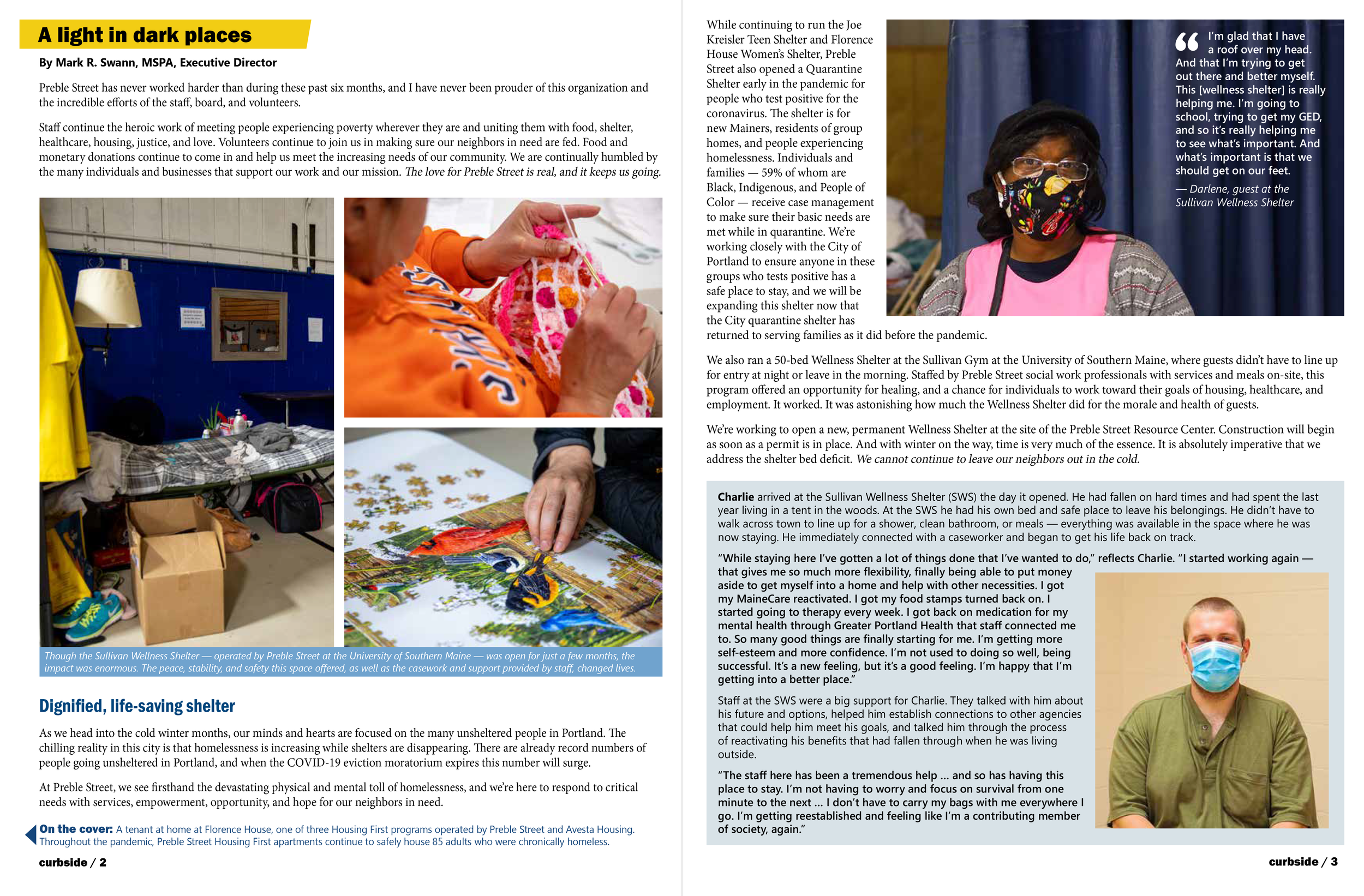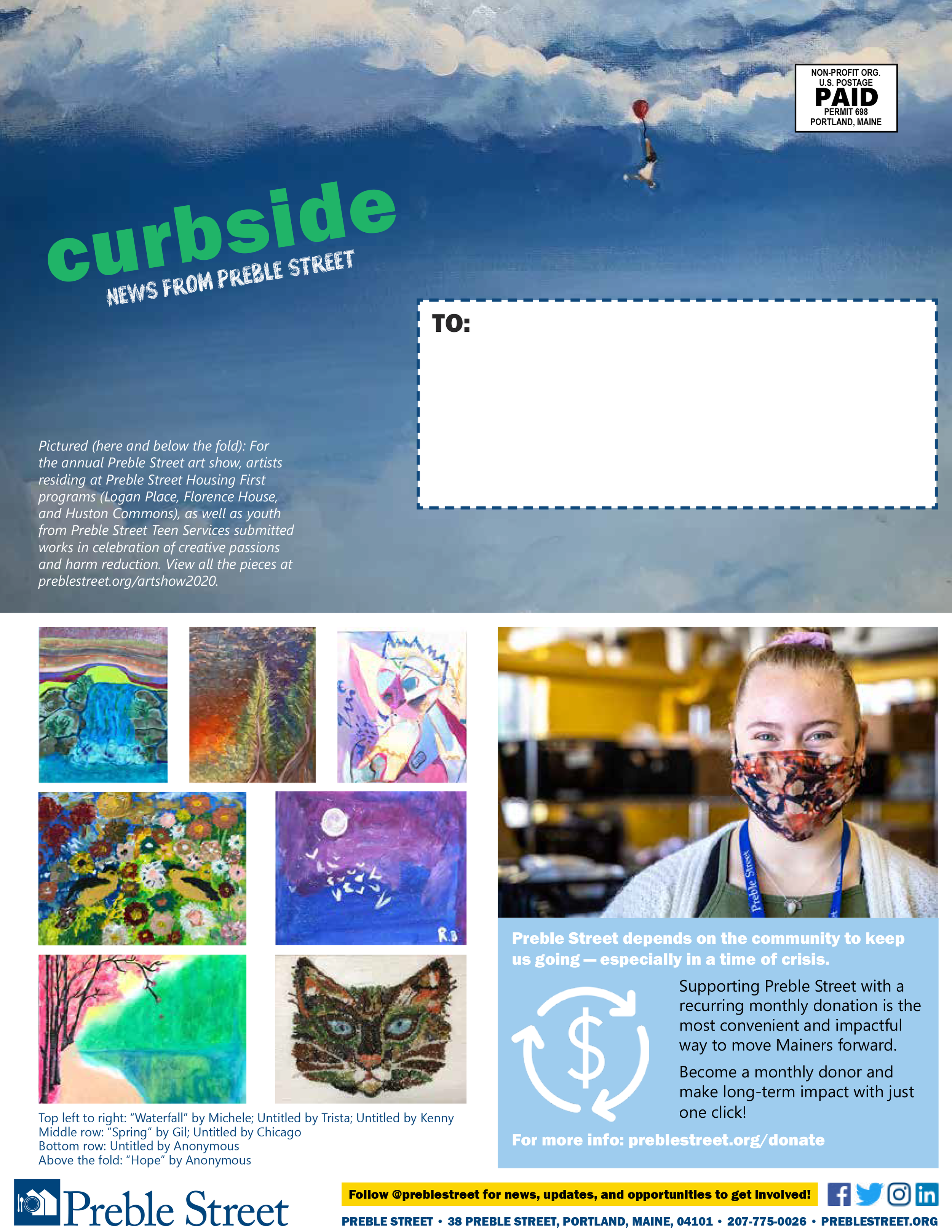#GivingTuesday Social Media Campaign
Concept • Strategy • Coordination • Photography • Design
Annual Appeal inserts & Print ADS
Concept • Coordination • Design • Editing
Biannual Print newsletter
Concept • Coordination • Design • Editing
Housing First Brochure
Concept • Coordination • Photography • Design • Editing
Photography
Video
Concept • Coordination • Videography • Interviewing • Editing
Writing Sample: Press conference Speech
Writing • Editing • Media Relations • Social Media
“Homelessness is traumatic. And we see firsthand that this trauma intensifies the challenges of connecting to stable housing.”
August 2, 2019 | Preble Street Teen Services Director Leah McDonald speaks at a press conference announcing a new HUD program that aims to prevent young adults who have aged out of the foster care system from falling into homelessness.
“Thank you so much for inviting us to participate in this event. Preble Street greatly appreciates our longstanding partnership with HUD in developing solutions to homelessness. We know real and sustainable solutions only work when there are deep partnerships at the local, state, and federal level.
On a single night last winter, 313 youth were homeless in Maine. That’s 28% of the state’s total homeless population. And every night Preble Street Teen Services shelters up to 24 youth here in Portland. Without this shelter, these youth would be on the street, sleeping in parks or abandoned buildings, or forced into unsafe situations putting their life and their future at risk.
For young people experiencing homelessness, there are so many risks. Homeless teens are more likely to attempt suicide. 70% of homeless youth report experiencing some kind of violence, with 32% reporting sexual assault. And the likelihood of being coerced into sex or labor trafficking increases.
Michaela was in the foster care system for her entire life, and when she turned 18 and aged out, there was nothing for her. No guidance. No support. No resources. No plan in place for her to learn what the next steps would be toward independence. She had nowhere else to go, and so she ended up at the Preble Street Joe Kreisler emergency teen shelter.
Michaela is one of many clients at Preble Street for whom the erosion of the social safety net is all too real. When Michaela aged out of foster care, she had never lived independently, she didn’t have a job, and she didn’t have any of the life skills needed to secure and maintain safe, stable, and independent housing.
Every young person we serve has a different story. Some were kicked out of their homes and are unable to return, some ran away from abuse, others are refugees or asylees having left their home country to find safety in Maine, others are victims of human trafficking, and many of these youth have interacted at one time or another with the foster care system.
But one thing all of these young people have in common is having experienced the trauma of homelessness. Homelessness is traumatic. And we see firsthand that this trauma intensifies the challenges of connecting to stable housing.
The trauma of being homeless led Michaela on a downward spiral. She became more connected to street culture, and the stress and suffering led to increased substance use.
But every time Michaela met with a caseworker, she made it very clear that what she wanted was to be housed. It is a tragedy that for Michaela and so many others we serve there are just not enough resources available to bridge the gap to independence, safety, and well-being. Shelter and drop-in services have become the safety net for the safety net. Youth come to us when there’s no other option.
At Preble Street we serve 250 youth age 12-20 each year to finally start to heal from the trauma of homelessness and build healthy supportive relationships. While every situation we encounter varies in severity, the dangers and health risks associated with homelessness can be deadly, and each young life affected by homelessness or instability is a tragedy we work hard to prevent.
Once basic needs are met, our staff build trust and work with youth to develop goals for their future, help them learn life skills and connect to resources to achieve these goals. Each year we help young people connect to primary care; get their GED/HiSET; reunite with family; and, critically, we help them secure safe, affordable housing.
For these young adults who have not had many opportunities to develop vocational and educational skills, vouchers can be a key piece of the puzzle as they make the difficult transition to independence.
The Foster Youth to Independence Initiative will help bridge the gap for these vulnerable youth as they make this transition. We applaud HUD for acting to ensure our most vulnerable youth are safe, and for giving them an opportunity to achieve independence and stability.”
Writing SAMPLE: Personal HISTORY
November 10, 2016














































